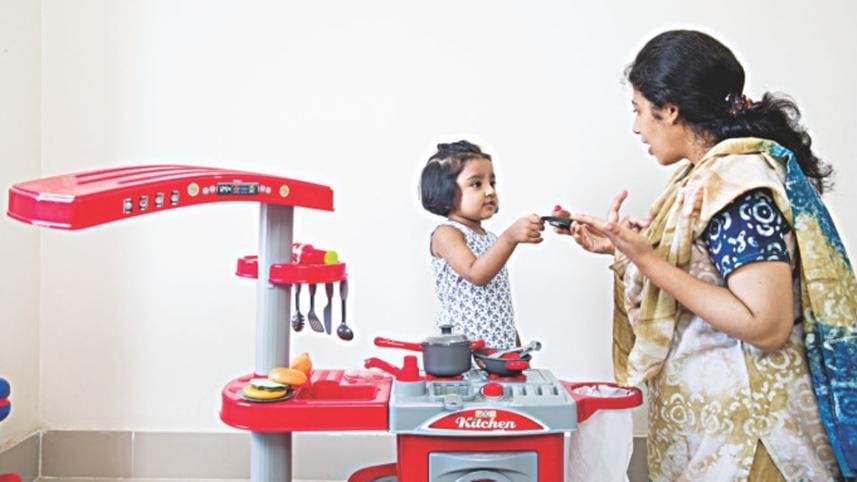When motherhood comes with fear

For mothers across Bangladesh, love for their daughters comes with an inseparable companion: fear. From Dhaka's crowded apartments to quiet village streets, raising girls in a patriarchal society demands constant vigilance, courage, and resilience.
Filmmaker Farhana Bulbul Kangkhita, mother of 12-year-old dancer Azra Akin Rahman Samriddhi, said raising a daughter comes with an invisible layer of responsibility and risk that parents of sons rarely feel. "Every choice -- what she wears, how she travels, when she returns home -- feels like a calculation. Public spaces, buses, even online platforms feel unsafe. It's not just fear for her body, but for her spirit -- that she might lose the sense of freedom every young girl deserves."
For Nabila Basher, mother of 12-year-old Anaisha Hossain now living in Canada, the distance brings perspective. "I wouldn't feel safe letting my daughter go out alone in Bangladesh until she's much older. My biggest fears would be abduction, sexual violence, even murder. Public transport and online spaces would constantly worry me."
For development professional Saudia Afrin, fear began early. Her daughter Adoita is only two-and-a-half. "She's so small, but I've already had to teach her about good and bad touch. It breaks my heart to prepare her for danger before she can even spell the word."
Shahira Sultana, owner of Toyomoy and mother of two daughters, said freedom must be negotiated daily. Her elder daughter Aurora, who has mild autism, faces barriers of acceptance. "For girls like her, the first challenge is inclusion. Even other parents teach their children to stay away." Her younger daughter, 11-year-old Aniya, though more independent, still grows up within invisible boundaries -- allowed to visit neighbours or attend tuition, but always under supervision.
In Kapasia, Gazipur, 35-year-old Roksana Akter, who never had formal education, shares the same anxiety. "Now girls have no safety. I always worry when my daughter Raisa goes to school. My mother didn't have to worry this much."
Experts say this fear leaves measurable marks on both mothers and daughters.
Physician and psychotherapy practitioner Dr Sunjida Shahriah said constant anxiety about daughters' safety takes a toll on mothers' mental health, triggering stress hormones that cause irritability and restlessness. "This over-caution can also undermine a girl's confidence. When she internalises limits early, she sees herself as trapped -- restricting her creativity and freedom."
These mothers carry a contradiction: protecting their daughters while teaching them not to be ruled by fear.
Farhana encourages Azra to find strength through dance -- a way to claim both confidence and freedom -- while reminding her that the world can be cruel.
Entrepreneur Fayeka Zabeen Siddiqua, mother of five-year-old Rehma, walks the same tightrope. "I want to raise a daughter who knows the world for what it is," she said. They take the metro, walk the streets, and join public celebrations. "I teach her to be cautious but also to take up space, knowing family and community stand behind her." Yet every outing comes with a silent calculation: should she let her travel alone or stay out late? "I know I'm not alone; mothers across Bangladesh walk this same line."
Saudia often feels torn between courage and caution. "Fear stops me from letting her try things she wants. It's heartbreaking. I feel guilty, like I can never protect her enough."
Farhana confessed she sometimes cries after warning Azra to 'be careful'. "I worry I'm stealing small pieces of her girlhood."
For Shahira, the pain runs deeper. "Differently-abled girls are not welcome anywhere -- not in schools, not in public spaces. Freedom feels like a luxury."
Fayeka refuses to carry the burden alone. "Society and policymakers should feel guilt," she said. "They've failed their daughters."
Despite everything, these mothers hold on to hope. Farhana envisions a Bangladesh where girls live without fear, valued for their minds and talents -- not judged by gender. "Where boys are raised with empathy, not entitlement, and schools teach kindness and consent as seriously as math."
Shahira's wish is simple: dignity and inclusion. "For those with disabilities, stronger laws and real enforcement are needed so our daughters can live with dignity -- even when we're gone."
Roksana Sultana, executive director of Breaking The Silence, said equality begins at home. "Families must raise sons and daughters alike, not by outdated gender roles. Prevention at family and community levels is far more effective than law after abuse occurs."
She called for stronger local systems -- community schools, safer public spaces, and strict penalties -- to dismantle the culture of impunity that breeds fear.
Dr Shahriah added that while boys and girls may differ physically, their dignity must remain equal. "Equal inheritance, economic security, and education empower girls toward independence."




 For all latest news, follow The Daily Star's Google News channel.
For all latest news, follow The Daily Star's Google News channel.
Comments